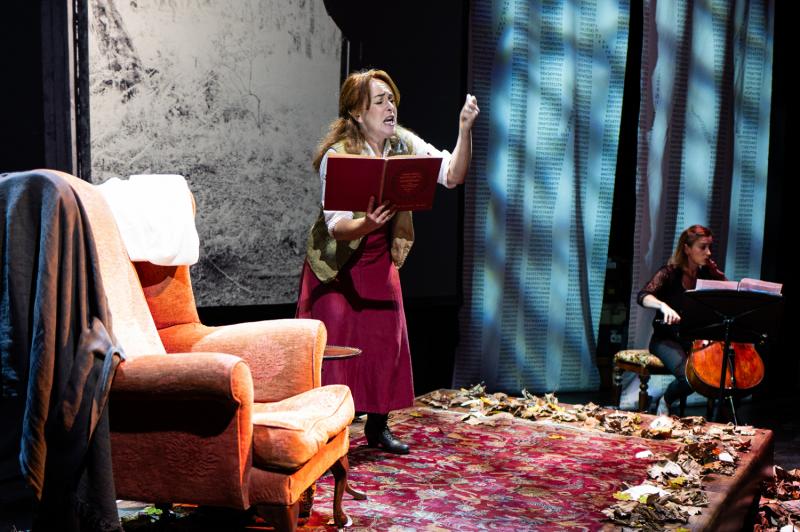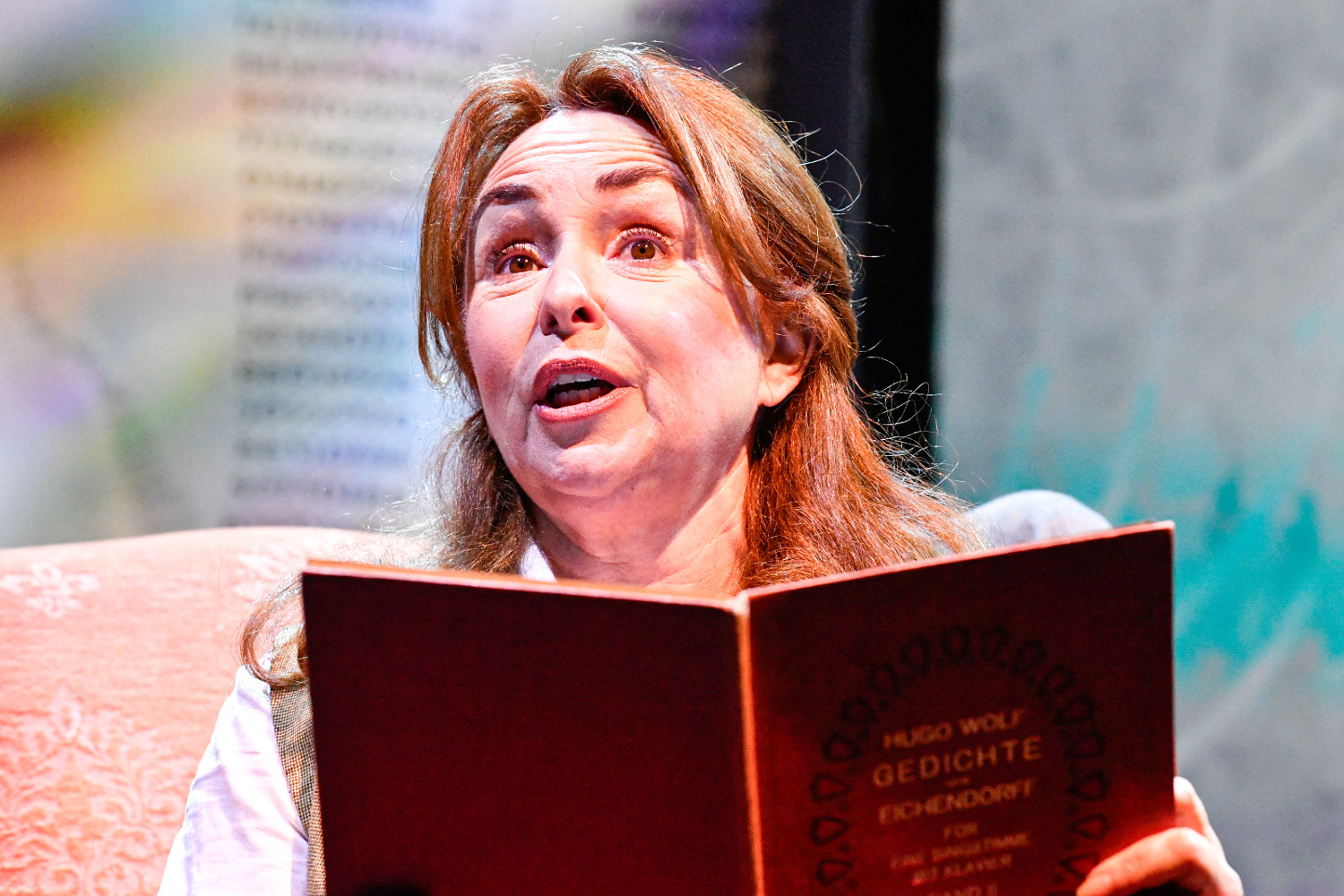The Most Precious of Goods, Marylebone Theatre review - old-fashioned storytelling of an all-too relevant tale | reviews, news & interviews
The Most Precious of Goods, Marylebone Theatre review - old-fashioned storytelling of an all-too relevant tale
The Most Precious of Goods, Marylebone Theatre review - old-fashioned storytelling of an all-too relevant tale
An account of one family's near-destruction in the Holocaust given added strength by an uncluttered staging

As last week’s news evidenced, genocide never really goes out of fashion. So it’s only right and proper that art continues to address the hideous concept and, while nothing, not even Primo Levi’s shattering If This Is a Man, can capture the scale of the depravity of the camps, it is important that the warning from history is regularly proclaimed anew – and heeded.
With just a few bleak, snowy back-projections of Silesia’s woodland near Auschwitz (it was enough to chill my soul with memories of a visit 34 years ago) and a lone cellist (Gemma Rosefield) to accompany her on stage, Samantha Spiro (pictured below) reads us a story. It’s more Grimm than grim to begin with, but soon the fairytale morphs into a nightmare. The shadow of the trains, rolling over straight, unbombed railway lines with their cargo of “goods”, falls across the narrative and we know where we are. Soon to be released as a major animated movie, Jean-Claude Grumberg’s novel draws on his family history of transportation to the death camps. There’s a slightly uncomfortable coda that complicates the “truth” of everything we heard, but it’s really just an underlining that the specific story is less important than its standing as an exemplar, not just for the millions of victims of the Holocaust. It also leaves us with the triumph of love that underpins the show’s bittersweet conclusion.
Soon to be released as a major animated movie, Jean-Claude Grumberg’s novel draws on his family history of transportation to the death camps. There’s a slightly uncomfortable coda that complicates the “truth” of everything we heard, but it’s really just an underlining that the specific story is less important than its standing as an exemplar, not just for the millions of victims of the Holocaust. It also leaves us with the triumph of love that underpins the show’s bittersweet conclusion.
Twins are born in France, but their parents are rounded up and packed on to one of those terrible trains to take them to near-certain extermination. The mother can suckle only one baby, so the father takes the heartbreaking decision to throw the girl, wrapped in his prayer shawl, through the bars of the cattle truck’s window into the snow, towards a woman who is the kid’s only, slim hope.
The father survives through a combination of his job as a shaver of heads, but mostly iron will and dumb luck, and the baby survives through the love of the woman and the two men who, eventually, find compassion in their hearts. We guess that these three, against all odds, will meet when the slaughter abates – and they do – but we cannot guess the outcome of that encounter.
Samantha Spiro’s reading brings the text to life with the minimum of different accents and visual characterisation (I was reminded of a low key episode of the BBC’s long-running children’s programme, Jackanory). Crucially, she largely lets the words speak for themselves. That’s a wise decision by director, Nicolas Kent, who also translated the work. There’s plenty enough to grip the house in the unfolding tale, but the unfussy baldness of the staging creates the sense of a testament, a witness statement, a window on unknowable distress and fear.
Don’t take my word for this sparse production's power to compel one's full attention. I saw a matinee attended by 50 or more kids aged about 14, all in uniform, all excited at the prospect of an afternoon out of school. "They're going to spoil it for everyone, scrolling through Insta and wriggling about," I thought to myself, as the lights went down on the 80 minutes all-through reading. But I was wrong.
- The Most Precious of Goods at Marylebone Theatre until 3 February
- More theatre reviews on theartsdesk
rating
Explore topics
Share this article
The future of Arts Journalism
You can stop theartsdesk.com closing!
We urgently need financing to survive. Our fundraising drive has thus far raised £49,000 but we need to reach £100,000 or we will be forced to close. Please contribute here: https://gofund.me/c3f6033d
And if you can forward this information to anyone who might assist, we’d be grateful.

Subscribe to theartsdesk.com
Thank you for continuing to read our work on theartsdesk.com. For unlimited access to every article in its entirety, including our archive of more than 15,000 pieces, we're asking for £5 per month or £40 per year. We feel it's a very good deal, and hope you do too.
To take a subscription now simply click here.
And if you're looking for that extra gift for a friend or family member, why not treat them to a theartsdesk.com gift subscription?
more Theatre
 The Weir, Harold Pinter Theatre review - evasive fantasy, bleak truth and possible community
Three outstanding performances in Conor McPherson’s atmospheric five-hander
The Weir, Harold Pinter Theatre review - evasive fantasy, bleak truth and possible community
Three outstanding performances in Conor McPherson’s atmospheric five-hander
 Dracula, Lyric Hammersmith review - hit-and-miss recasting of the familiar story as feminist diatribe
Morgan Lloyd Malcolm's version puts Mina Harkness centre-stage
Dracula, Lyric Hammersmith review - hit-and-miss recasting of the familiar story as feminist diatribe
Morgan Lloyd Malcolm's version puts Mina Harkness centre-stage
 The Code, Southwark Playhouse Elephant review - superbly cast, resonant play about the price of fame in Hollywood
Tracie Bennett is outstanding as a ribald, riotous Tallulah Bankhead
The Code, Southwark Playhouse Elephant review - superbly cast, resonant play about the price of fame in Hollywood
Tracie Bennett is outstanding as a ribald, riotous Tallulah Bankhead
 Reunion, Kiln Theatre review - a stormy night in every sense
Beautifully acted, but desperately grim drama
Reunion, Kiln Theatre review - a stormy night in every sense
Beautifully acted, but desperately grim drama
 The Lady from the Sea, Bridge Theatre review - flashes of brilliance
Simon Stone refashions Ibsen in his own high-octane image
The Lady from the Sea, Bridge Theatre review - flashes of brilliance
Simon Stone refashions Ibsen in his own high-octane image
 Romans: A Novel, Almeida Theatre review - a uniquely extraordinary work
Alice Birch’s wildly epic family drama is both mind-blowing and exasperating
Romans: A Novel, Almeida Theatre review - a uniquely extraordinary work
Alice Birch’s wildly epic family drama is both mind-blowing and exasperating
 The Producers, Garrick Theatre review - Ve haf vays of making you laugh
You probably know what's coming, but it's such great fun!
The Producers, Garrick Theatre review - Ve haf vays of making you laugh
You probably know what's coming, but it's such great fun!
 Not Your Superwoman, Bush Theatre review - powerful tribute to the plight and perseverance of Black women
Golda Rosheuvel and Letitia Wright excel in a super new play
Not Your Superwoman, Bush Theatre review - powerful tribute to the plight and perseverance of Black women
Golda Rosheuvel and Letitia Wright excel in a super new play
 Cow | Deer, Royal Court review - paradox-rich account of non-human life
Experimental work about nature led by Katie Mitchell is both extraordinary and banal
Cow | Deer, Royal Court review - paradox-rich account of non-human life
Experimental work about nature led by Katie Mitchell is both extraordinary and banal
 Deaf Republic, Royal Court review - beautiful images, shame about the words
Staging of Ukrainian-American Ilya Kaminsky’s anti-war poems is too meta-theatrical
Deaf Republic, Royal Court review - beautiful images, shame about the words
Staging of Ukrainian-American Ilya Kaminsky’s anti-war poems is too meta-theatrical
 Laura Benanti: Nobody Cares, Underbelly Boulevard Soho review - Tony winner makes charming, cheeky London debut
Broadway's acclaimed Cinderella, Louise, and Amalia reaches Soho for a welcome one-night stand
Laura Benanti: Nobody Cares, Underbelly Boulevard Soho review - Tony winner makes charming, cheeky London debut
Broadway's acclaimed Cinderella, Louise, and Amalia reaches Soho for a welcome one-night stand
 The Pitchfork Disney, King's Head Theatre review - blazing with dark energy
Thrilling revival of Philip Ridley’s cult classic confirms its legendary status
The Pitchfork Disney, King's Head Theatre review - blazing with dark energy
Thrilling revival of Philip Ridley’s cult classic confirms its legendary status

Add comment